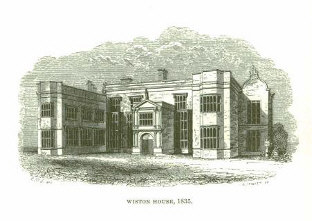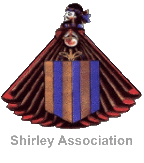|
|

Chronology of the Life of
Sir Thomas Sherley, the Elder,
Of Wiston Sussex
Account of Sir Thomas Sherley's Audience with Queen Elizabeth
Regarding Securing Provisions for the Earl of Leicester's Troops
in the Netherlands ("Low Countries")
History of the United Netherlands, 1585-86,
Author: John Lothrop Motley
Before Heneage had arrived in the Netherlands, Sir Thomas
Shirley,
despatched by Leicester to England with a commission to procure
supplies
for the famishing soldiers, and, if possible, to mitigate the
Queen's
wrath, had, been admitted more than once to her Majesty's presence.
He
had fought the Earl's battle as manfully as Davison had done,
and, like
that envoy, had received nothing in exchange for his plausible
arguments
but bitter words and big oaths. Eight days after his arrival
he was
introduced by Hatton into the privy chamber, and at the moment
of his
entrance was received with a volley of execrations.
"I did expressly and peremptorily forbid his acceptance
of the absolute
government, in the hearing of divers of my council," said
the Queen.
Shirley.--"The necessity of the case was imminent, your
Highness.
It was his Lordship's intent to do all for your Majesty's service.
Those countries did expect him as a governor at his first landing,
and the States durst do no other than satisfy the people also
with that
opinion. The people's mislike of their present government is
such and so
great as that the name of States is grown odious amongst them.
Therefore
the States, doubting the furious rage of the people, conferred
the
authority upon his Lordship with incessant suit to him to receive
it.
Notwithstanding this, however, he did deny it until he saw plainly
both
confusion and ruin of that country if he should refuse. On the
other
hand, when he had seen into their estates, his lordship found
great
profit and commodity like to come unto your Majesty by your acceptance
of
it. Your Highness may now have garrisons of English in as many
towns as
pleaseth you, without any more charge than you are now at. Nor
can any
peace be made with Spain at any time hereafter, but through you:
and by
you. Your Majesty should remember, likewise, that if a man of
another
nation had been chosen governor it might have wrought great danger.
Moreover it would have been an indignity that your lieutenant-general
should of necessity be under him that so should have been elected.
Finally, this is a stop to any other that may affect the place
of
government there."
Queen (who has manifested many signs of impatience during
this
discourse).--"Your speech is all in vain. His Lordship's
proceeding is
sufficient to make me infamous to all princes, having protested
the
contrary, as I have done, in a book which is translated into
divers and
sundry languages. His Lordship, being my servant, a creature
of my own,
ought not, in duty towards me, have entered into this course
without my
knowledge and good allowance."
Shirley.--"But the world hath conceived a high judgment
of your Majesty's
great wisdom and providence; shown by your assailing the King
of Spain at
one time both in the Low Countries and also by Sir Francis Drake.
I do
assure myself that the same judgment which did first cause you
to take
this in hand must continue a certain knowledge in your Majesty
that one
of these actions must needs stand much better by the other. If
Sir
Frances do prosper, then all is well. And though he should not
prosper,
yet this hold that his Lordship hath taken for you on the Low
Countries
must always assure an honourable peace at your Highness's pleasure.
I
beseech your Majesty to remember that to the King of Spain the
government
of his Lordship is no greater matter than if he were but your
lieutenant-
general there; but the voyage of Sir Francis is of much greater
offence
than all."
Queen (interrupting).--"I can very well answer for Sir
Francis.
Moreover, if need be, the gentleman careth not if I should disavow
him."
Shirley.--"Even so standeth my Lord, if your disavowing
of him may also
stand with your Highness's favour towards him. Nevertheless;
should this
bruit of your mislike of his Lordship's authority there come
unto the
ears of those people; being a nation both sudden and suspicious,
and
having been heretofore used to stratagem--I fear it may work
some strange
notion in them, considering that, at this time, there is an increase
of
taxation raised upon them, the bestowing whereof perchance they
know
not of. His Lordship's giving; up of the government may leave
them
altogether without government, and in worse case than they were
ever
in before. For now the authority of the States is dissolved,
and his
Lordship's government is the only thing that holdeth them together.
I do beseech your Highness, then, to consider well of it, and
if there
be any private cause for which you take grief against his Lordship,
nevertheless, to have regard unto the public cause, and to have
a care
of your own safety, which in many wise men's opinions, standeth
much
upon the good maintenance and upholding of this matter."
Queen.--"I believe nothing of, what you say concerning
the dissolving of
the authority of the States. I know well enough that the States
do
remain states still. I mean not to do harm to the cause, but
only to
reform that which his Lordship hath done beyond his warrant from
me."
And with this the Queen swept suddenly from the apartment.
Sir Thomas,
at different stages of the conversation, had in vain besought
her to
accept a letter from the Earl which had been entrusted to his
care.
She obstinately refused to touch it. Shirley had even had recourse
to
stratagem: affecting ignorance on many points concerning which
the Queen
desired information, and suggesting that doubtless she would
find those
matters fully explained in his Lordship's letter. The artifice
was in
vain, and the discussion was, on the whole, unsatisfactory. Yet
there is
no doubt that the Queen had had the worst of the argument, and
she was
far too sagacious a politician not to feel the weight of that
which had
been urged so often in defence of the course pursued. But it
was with
her partly a matter of temper and offended pride, perhaps even
of wounded
affection.
On the following morning Shirley saw the Queen walking in
the garden of
the palace, and made bold to accost her. Thinking, as he said,
"to test
her affection to Lord Leicester by another means," the artful
Sir Thomas
stepped up to her, and observed that his Lordship was seriously
ill.
"It is feared," he said, "that the Earl is again
attacked by the disease
of which Dr. Goodrowse did once cure him. Wherefore his Lordship
is now
a humble suitor to your Highness that it would please you to
spare
Goodrowse, and give him leave to go thither for some time."
The Queen was instantly touched.
"Certainly--with all my heart, with all my heart, he
shall have him," she
replied, "and sorry I am that his Lordship hath that need
of him."
"And indeed," returned sly Sir Thomas, "your
Highness is a very gracious
prince, who are pleased not to suffer his Lordship to perish
in health,
though otherwise you remain deeply offended with him."
"You know my mind," returned Elizabeth, now all
the queen again, and
perhaps suspecting the trick; "I may not endure that any
man should alter
my commission and the authority that I gave him, upon his own
fancies and
without me."
With this she instantly summoned one of her gentlemen, in
order to break
off the interview, fearing that Shirley was about to enter again
upon a
discussion of the whole subject, and again to attempt the delivery
of the
Earl's letter.
In all this there was much of superannuated coquetry, no doubt,
and much
of Tudor despotism, but there was also a strong infusion of artifice.
For it will soon be necessary to direct attention to certain
secret
transactions of an important nature in which the Queen was engaged,
and
which were even hidden from the all-seeing eye of Walsingham--although
shrewdly suspected both by that statesman and by Leicester--but
which
were most influential in modifying her policy at that moment
towards the
Netherlands.
There could be no doubt, however, of the stanch and strenuous
manner in
which the delinquent Earl was supported by his confidential messengers
and by some of his fellow-councillors. His true friends were
urgent that
the great cause in which he was engaged should be forwarded sincerely
and
without delay. Shirley had been sent for money; but to draw money
from
Elizabeth was like coining her life-blood, drachma by drachma.
"Your Lordship is like to have but a poor supply of money
at this time,"
said Sir Thomas. "To be plain with you, I fear she groweth
weary of the
charge, and will hardly be brought to deal thoroughly in the
action."
He was also more explicit than he might have been--had he
been better
informed as to the disposition of the chief personages of the
court,
concerning whose temper the absent Earl was naturally anxious.
Hatton
was most in favour at the moment, and it was through Hatton that
the
communications upon Netherland matters passed; "for,"
said Shirley, "she
will hardly endure Mr. Secretary (Walsingham) to speak unto her
therein."
"And truly, my Lord," he continued, "as Mr.
Secretary is a noble, good,
and true friend unto you, so doth Mr. Vice-Chamberlain show himself
an
honourable, true, and faithful gentleman, and doth carefully
and most
like a good friend for your Lordship."
And thus very succinctly and graphically had the envoy painted
the
situation to his principal. "Your Lordship now sees things
just as they
stand," he moralized. "Your Lordship is exceeding wise.
You know the
Queen and her nature best of any man. You know all men here.
Your
Lordship can judge the sequel by this that you see: only this
I must tell
your Lordship, I perceive that fears and doubts from thence are
like to
work better effects here than comforts and assurance. I think
it my part
to send your Lordship this as it is, rather than to be silent."
And with these rather ominous insinuations the envoy concluded
for the
time his narrative. |



 Shirleys
of
Shirleys
of